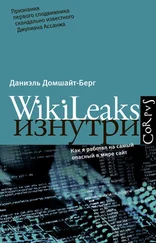Harding, Luke - WikiLeaks - Inside Julian Assange's War on Secrecy
Здесь есть возможность читать онлайн «Harding, Luke - WikiLeaks - Inside Julian Assange's War on Secrecy» весь текст электронной книги совершенно бесплатно (целиком полную версию без сокращений). В некоторых случаях можно слушать аудио, скачать через торрент в формате fb2 и присутствует краткое содержание. Жанр: Старинная литература, на английском языке. Описание произведения, (предисловие) а так же отзывы посетителей доступны на портале библиотеки ЛибКат.
- Название:WikiLeaks: Inside Julian Assange's War on Secrecy
- Автор:
- Жанр:
- Год:неизвестен
- ISBN:нет данных
- Рейтинг книги:3 / 5. Голосов: 1
-
Избранное:Добавить в избранное
- Отзывы:
-
Ваша оценка:
- 60
- 1
- 2
- 3
- 4
- 5
WikiLeaks: Inside Julian Assange's War on Secrecy: краткое содержание, описание и аннотация
Предлагаем к чтению аннотацию, описание, краткое содержание или предисловие (зависит от того, что написал сам автор книги «WikiLeaks: Inside Julian Assange's War on Secrecy»). Если вы не нашли необходимую информацию о книге — напишите в комментариях, мы постараемся отыскать её.
WikiLeaks: Inside Julian Assange's War on Secrecy — читать онлайн бесплатно полную книгу (весь текст) целиком
Ниже представлен текст книги, разбитый по страницам. Система сохранения места последней прочитанной страницы, позволяет с удобством читать онлайн бесплатно книгу «WikiLeaks: Inside Julian Assange's War on Secrecy», без необходимости каждый раз заново искать на чём Вы остановились. Поставьте закладку, и сможете в любой момент перейти на страницу, на которой закончили чтение.
Интервал:
Закладка:
The Guardian posted its own riposte. It pointed out that the paper had carefully redacted many cables. This was done “in order to protect a number of named sources and so as not to disclose certain details of special operations”.
The New York Times also vigorously defended its decision to publish: “The cables tell the unvarnished story of how the government makes its biggest decisions, the decisions that cost the country most heavily in lives and money. They shed light on the motivations – and, in some cases, the duplicity – of allies on the receiving end of American courtship and foreign aid. They illuminate the diplomacy surrounding two current wars and several countries, like Pakistan and Yemen, where American military involvement is growing. As daunting as it is to publish such material over official objections, it would be presumptuous to conclude that Americans have no right to know what is being done in their name.”
Franco Frattini, Italy’s foreign minister, was one of the earliest politicians to grasp that the leak could not be undone, and was game-changing. “It will be the 9/11 of world diplomacy,” he exclaimed. For once the comparison didn’t look like hyperbole. “It was being discussed in the White House, the Kremlin, the Élysée, by Berlusconi and the UN, by Chávez, in Canberra, in every capital city of the world,” Rusbridger said. “The ones where it wasn’t being discussed, you knew they were bracing themselves. You just had this sense of mayhem being let loose. All these incredibly powerful people, the most powerful people in the world, were scrambling into emergency board meetings.”
At Kings Place, the following day’s editorial conference was more crowded than usual. Morning conferences are a Guardian ritual: the heads of department – home, foreign, city, sport, as well as features, comment and arts – give a quick run-down of the day’s offerings. All staff can attend and anybody can speak. The seating arrangement mirrors the Guardian ’s unspoken hierarchy: Rusbridger sits in the middle of an elongated yellow sofa; junior staff perch uncomfortably on stools around the glass walls. After the news roundup the editor typically says: “What else?” The words are often hard to hear. It is a brave, or foolish, person who opens the debate; sometimes the silence extends awkwardly for 10 seconds. This morning, however, there was no hesitation. The room was packed; the atmosphere one of excitement, and astonishment that the Guardian had managed, with a few glitches, to pull the story off.
One of the unfamiliar faces there was Luke Harding, the Guardian ’s Moscow correspondent, who had mined the cables for a series of hard-hitting stories about Russia and who, having just returned again from Moscow, stood unshaven and jet-lagged next to the door. Ian Katz recalled Sunday’s dramatic events and explained the decision to bring forward publication when it became clear that Cablegate itself had sprung a leak. Katz described the Guardian ’s sitcom-style wranglings with its many Euro-partners: “It was a cross between running a Brussels committee and an episode of ’ Allo ’Allo! ” He came up with a characteristically rococo analogy – “like being a kind of air traffic controller, with several small aircraft crashing at Stansted but managing to land a couple of big jets at Heathrow”.
The Guardian ’s website had gone “absolutely tonto”, Janine Gibson reported. The story produced remarkable traffic – the 4.1 million unique users clicking on it that day was the highest ever. Record numbers would continue, with 9.4 million browsers viewing WikiLeaks stories between 28 November and 14 December. Some 43% of them came from the US. The Guardian team had designed an interactive graphic allowing readers to carry out their own searches of the cable database. This feature became the most popular aspect of the Guardian ’s coverage. People from around the world looked to see what US officials had privately written about their rulers. “This was really pleasing,” says Gibson. “People were looking for themselves and engaging with the cables and not just the Assange-ness.”
As the cables rolled out day by day, an ugly, and in many ways deranged, backlash took place in the US. A vengeful chorus came mostly from Republicans. New York congressman Peter King, incoming chair of the homeland security committee, talked of “treason” and proposed WikiLeaks should be designated as “a foreign terrorist organisation”. Eschewing any risk of understatement, he said: “WikiLeaks presents a clear and present danger to the national security of the US.”
Congressman Pete Hoekstra of Michigan was reported calling for executions. “Clearly the person that leaked the information or hacked into our systems we can go after and we can probably go after them for espionage and maybe treason. If we go after them, and are able to convict them on treason, then the death penalty comes into play.”
His Michigan colleague, Mike Rogers, was not to be outdone. He told a local radio station: “I argue the death penalty clearly should be considered here. He clearly aided the enemy to what may result in the death of US soldiers, or those co-operating. If that is not a capital offence, I don’t know what is.”
Former Alaska governor Sarah Palin, darling of the unhinged right, denounced Assange’s “sick, un-American espionage” and came close to inciting his assassination: “Why was he not pursued with the same urgency we pursue al-Qaida and Taliban leaders? … He is an anti-American operative with blood on his hands.”
But it was Senator Joe Lieberman, Senate homeland security committee chairman, a foreign policy hawk and maverick Democrat, who was the most practical attack dog. Lieberman described the leak in apocalyptic terms as “an outrageous, reckless and despicable action that will undermine the ability of our government and our partners to keep our people safe and to work together to defend our vital interests”. He stopped short of denouncing Assange as a “terrorist” but said: “It’s a terrible thing that WikiLeaks did. I hope we are doing everything we can to shut down their website.”
On the first day of publication of the cables, Sunday, WikiLeaks came under massive hacker attack. The net traffic heading to WikiLeaks leapt from 13 gigabits (thousand million bits) per second to around 17Gbps. It peaked at 18Gbps. WikiLeaks was no stranger to DDOS or “distributed denial of service” attacks. Someone controlling a “botnet” of tens of thousands of compromised Windows PCs was apparently orchestrating them in an attempt to bring wikileaks.org crashing down.
In a usual DDOS attack, the PCs try to communicate with the targeted site. A typical method is to send a “ping” request with a few packets of data. It’s a bit like ringing the site’s front doorbell. The site generally responds by acknowledging that the data reached it. On its own, a ping request is easy for a site to deal with. But when a blizzard of them arrives from all over the world and continues and continues, it becomes impossible for the site to do anything useful: it’s too busy answering the ping requests to deliver any useful data.
The DDOS attack that hit WikiLeaks that afternoon was eight times as large as any previous ones. The hacker behind it appeared to be a curious right-wing patriot called “The Jester” – or, in the argot he used, “th3j35t3r”. The Jester described himself as a “hacktivist for good”. His goal, as stated on his Twitter account, was to obstruct “the lines of communication for terrorists, sympathisers, fixers, facilitators, oppressive regimes and general bad guys”. As the attacks continued to pummel WikiLeaks, he tweeted excitedly: “www.wikileaks.org – TANGO DOWN – for attempting to endanger the lives of our troops, ‘other assets’ & foreign relations.” Normally, The Jester preferred to disrupt sites he viewed as being used by jihadist groups and other Islamist revolutionaries; every time he succeeded he sent the same delighted message: “TANGO DOWN”. Believed to be a former US military recruit, The Jester appeared to have decided on this occasion to target Assange.
Читать дальшеИнтервал:
Закладка:
Похожие книги на «WikiLeaks: Inside Julian Assange's War on Secrecy»
Представляем Вашему вниманию похожие книги на «WikiLeaks: Inside Julian Assange's War on Secrecy» списком для выбора. Мы отобрали схожую по названию и смыслу литературу в надежде предоставить читателям больше вариантов отыскать новые, интересные, ещё непрочитанные произведения.
Обсуждение, отзывы о книге «WikiLeaks: Inside Julian Assange's War on Secrecy» и просто собственные мнения читателей. Оставьте ваши комментарии, напишите, что Вы думаете о произведении, его смысле или главных героях. Укажите что конкретно понравилось, а что нет, и почему Вы так считаете.












